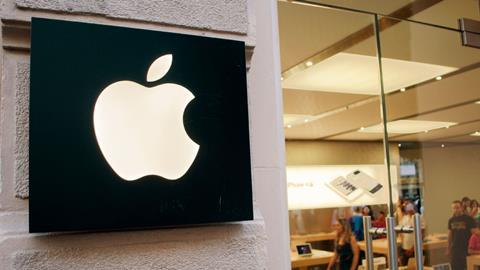Technology giant Apple has lost a bid to reveal a proposed representative claimant’s after-the-event insurance premiums, with the Competition Appeal Tribunal ruling that disclosure would provide an ‘unfair tactical advantage’ by revealing the insurers’ assessment of risk.
Apple is facing a potential collective action worth up to £1.5bn brought on behalf of almost 20 million users of iPhones and iPads in the UK over allegedly abusive conduct in relation to app distribution and payment processing services on certain Apple devices provided via the App Store.
Dr Rachael Kent, a lecturer in the digital economy at King’s College London, is the proposed class representative for the opt-out claim on behalf of users who purchased paid apps, paid subscriptions or made other in-app purchases since October 2015.
In support of her application for a collective proceedings order (CPO), Kent served a litigation plan and a litigation budget to trial – which is said to be just over £15.3m, not including after-the-event insurance premiums. The total funded amount is stated to be just under £11.3m, including the premiums.
Kent also served a litigation funding arrangement and her ATE policy – under which four insurers have covered her liability to pay Apple’s costs up to a total of £10m.
At a hearing last month, Apple challenged the confidentiality sought by Kent in respect of the premiums payable and the excess provision in the LFA.
In Kent v Apple Inc and another, the tribunal held that revealing the premiums ‘might disclose the assessment of risk and in that way confer tactical advantage on Apple’ and refused to order their disclosure – even though it was not satisfied that they were subject to legal advice privilege.
‘It is possible to gain insight into the thinking about the strength of an opponent’s case without necessarily being privy to the legal advice it has received,’ Mr Justice Morris said.
Apple’s contention that the excess provision should be disclosed was also rejected, with Morris finding that it was ‘likely to disclose the solicitors’ assessment of risk and thus has strategic sensitivity’.
Disclosure could also give Apple ‘the opportunity to engage in litigation tactics to drive up costs beyond the budgeted amounts for any stage of the litigation and thereby put pressure on [Kent’s] solicitors, knowing that they would bear those costs,’ Morris said.
A hearing to decide whether to grant a CPO in the proposed claim brought by Kent – who is represented by international disputes firm Hausfeld and backed by litigation funder Vannin Capital – is due to take in May.


















![David Lester (senior partner at Blythe Liggins), Darryl Barnes, Jagdeep Sandher (head of dispute resolution at Blythe Liggins)[4]](https://d1d8vslyhr7rdg.cloudfront.net/Pictures/274x183/4/2/8/116428_davidlesterseniorpartneratblytheligginsdarrylbarnesjagdeepsandherheadofdisputeresolutionatblytheliggins4_981603_crop.jpg)






No comments yet